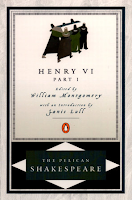not seeing what is likely to ensue,
This late dissension grown betwixt the peers
Burns under feigned ashes of forged love
And will at last break out into a flame.
As festered members rot but by degree
Till bones and flesh and sinews fall away,
So will this base and envious discord breed.
And now I fear that fatal prophecy
Which in the time of Henry named the Fifth
Was in the mouth of every sucking babe:
That Henry born at Monmouth should win all,
And Henry born at Windsor should lose all,
Which is so plain that Exeter doth wish
His days may finish ere that hapless time.
Henry VI, Part One is not very good. It was one of Shakespeare's first plays, if not the first, and probably a collaboration with others, which may account for how its parts sometimes seem at odds with each other. Then again, "parts at odds with each other" is on-brand for this play, which is all about how internal divisions brought the defeat of English forces under the early reign of Henry VI. Henry VI, Part One is a startlingly jingoistic play, one that depicts the French as a "fickle wavering nation," full of fay schemers, dabbling in witchcraft, relying on a woman--Joan of Arc--to do their dirty work. How in the world, the play asks, did we let these people take back the lands that were conquered under the heroic Henry V? The answer is that only the English can defeat the English: bickering and squabbling between the English powers are what led to military losses.
There are many factions among the English: there's the Cardinal Winchester, representative of the Church, who hates Gloucester, the Protector of the the king, who is not yet of age to rule alone, and thus the true power behind the throne. But these squabbles are minor compared to the enmity that rises up between Richard, later the Duke of York, and the Duke of Somerset, the representative of the Lancastrians. Henry VI, Part One is, among other things, about the birth of the Wars of the Roses: in one memorable scene, York and Somerset's partisans literally pick white and red roses from the bushes of the royal gardens to express their allegiances. It's these squabblers that doom Talbot, the commander in the French field and one of the last remaining icons of English courage and bravery. It's Talbot who gets some of the better lines, railing against Joan of Arc and her forces: "Pucelle or puzel, dauphin or dogfish, / Your hearts I'll stamp out with my horse's heels / And make a quagmire of your mingled brains." But these are empty promises: without the material support of York or Somerset, too busy fighting each other to commit their forces to the English cause, Talbot is defeated and killed.
The war stuff, honestly, is very boring. What nearly redeems the play is Joan of Arc, styled as "Pucelle," the maiden, whose language bears the imprint of the Shakespeare to come. Shakespeare's Pucelle is a vulgar braggart who asserts dominance over the French king by the sheer brazenness of her self-promotion. It's Joan who understands better than anyone on the French side what the death of Henry V and the rise of the boy king means: "Glory is like a circle in the water, / Which never ceaseth to enlarge itself, / Till by broad spreading it disperse to naught." She consorts with spirits, who refuse to help her in the final moments of French defeat. Knowing that France is doomed, she tries desperately to save herself, rejecting her own father to continue claiming a noble birth, then quickly discarding her "virgin" reputation by suggesting that she's pregnant to the English forces who would burn her at the stake.
No doubt she's meant to be a representation of fickle, filthy Frenchiness, but at times she seems like the only person worth rooting for. I loved how, when an English commander piles a heap of empty titles on the dead Talbot, Joan cuts through his blowhard patriotism: "Him that thou magnifi'st with all these titles / Stinking and flyblown lies here at our feet." This is ugly and vulgar, perhaps, but it's persuasive, and Shakespeare would later elevate a similar attitude to a kind of undeniable humanist dignity in Falstaff. Joan, at least, of all the characters in the play, knows that war is a dirty business.


No comments:
Post a Comment